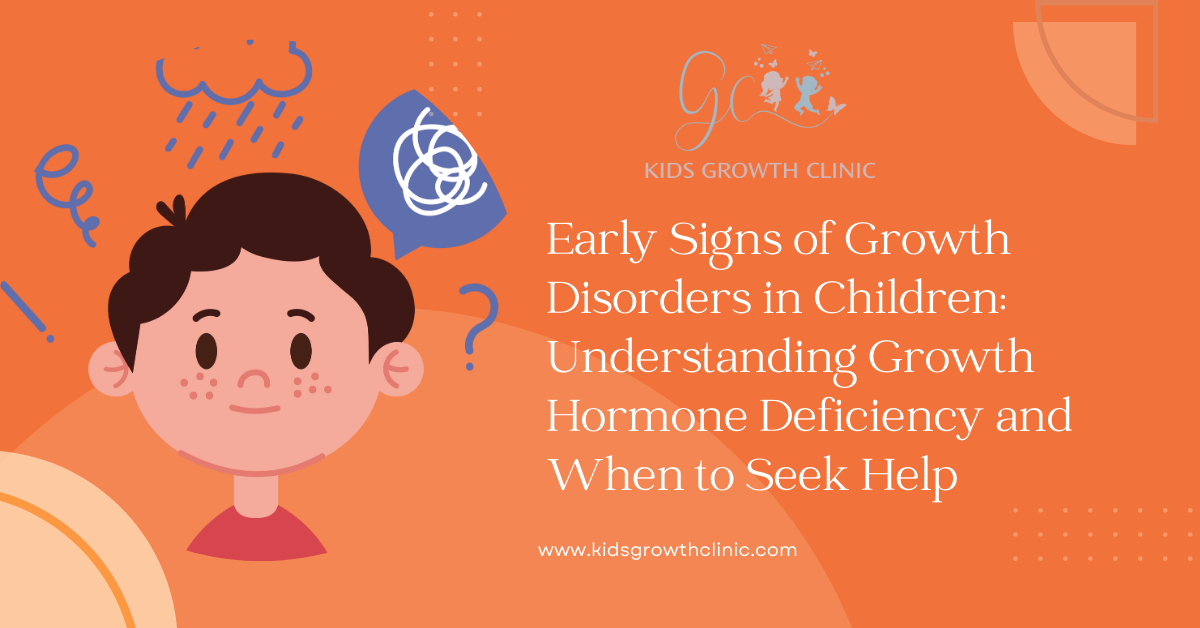Introduction
Growth is a fundamental aspect of a child’s development, but some children may experience growth disorders that prevent them from reaching their expected height. Growth hormone deficiency, short stature, and hormonal imbalances are some of the conditions that can affect a child’s growth. Identifying symptoms of growth disorders early can help parents seek appropriate medical interventions.
This article explores the causes of growth disorders, symptoms, available treatments, and when to consult a pediatric endocrinologist. If you’re concerned about your child’s growth, this guide will help you understand key warning signs and the best steps to take.

Outline
- What Are Growth Disorders in Children?
- What Causes Growth Disorders?
- Signs and Symptoms of Growth Disorders
- How Is Growth Measured in Children?
- Growth Hormone Deficiency: What You Need to Know
- The Role of Growth Hormone in Child Development
- Diagnosis and Tests for Growth Disorders
- Treatment Options for Growth Disorders
- Growth Hormone Therapy: Is It Effective?
- When to See a Pediatric Endocrinologist?
1. What Are Growth Disorders in Children?
A growth disorder refers to any condition that affects a child’s ability to grow at a normal rate. Some children may experience growth delay, while others may have genetic or hormonal conditions affecting their growth potential.
Common growth disorders in children include:
- Growth Hormone Deficiency (GHD) – The pituitary gland does not produce enough growth hormone.
- Turner Syndrome – A genetic disorder affecting growth in girls.
- Constitutional Growth Delay – Children grow at a slower rate but catch up later.
- Intrauterine Growth Restriction (IUGR) – Poor growth before birth.
2. What Causes Growth Disorders?
A growth disorder can be caused by:
- Genetic conditions like Turner syndrome or genetic disorders.
- Hormonal imbalances, especially affecting the pituitary gland.
- Nutritional deficiencies impacting growth and development.
- Chronic illnesses such as kidney disease or celiac disease.
- Delayed puberty affecting the child’s ability to reach their full growth potential.
3. Signs and Symptoms of Growth Disorders
Symptoms of growth disorders include:
- Slow growth compared to children of the same age.
- Short stature and not meeting expected height milestones.
- Growth failure, where the child’s growth rate slows down.
- Puberty delays or abnormal growth spurts.
- Bone growth abnormalities.
If you notice these signs of growth disorders, consult a doctor for further evaluation.
4. How Is Growth Measured in Children?
Doctors assess growth using a growth chart, which tracks:
- Height and growth rate over time.
- Comparison to standardized growth patterns.
- X-ray of growth plates to check bone development.
- Blood tests to evaluate hormone levels.
5. Growth Hormone Deficiency: What You Need to Know
Growth hormone deficiency (GHD) occurs when the pituitary gland does not produce enough growth hormone. This leads to slow growth, delayed puberty, and short stature.
Common causes of GHD include:
- Congenital conditions affecting hormone production.
- Brain injuries or tumors impacting the pituitary gland.
- Idiopathic causes where no clear reason is found.
6. The Role of Growth Hormone in Child Development
Growth hormone is essential for:
- Stimulating bone growth.
- Regulating metabolism and muscle growth.
- Ensuring children reach their full growth potential.
- Supporting normal growth rate during childhood immunization and puberty.
7. Diagnosis and Tests for Growth Disorders
A pediatric endocrinologist may recommend:
- Growth hormone stimulation test to check hormone levels.
- X-ray of growth plates to assess bone development.
- Blood tests for hormonal imbalances.
8. Treatment Options for Growth Disorders
Treatment depends on the cause of growth disorder. Options include:
- Nutritional support for children with growth problems.
- Hormone replacement therapy for conditions like Turner syndrome.
- Medication to stimulate growth for those with growth hormone deficiency.
9. Growth Hormone Therapy: Is It Effective?
Growth hormone therapy involves:
- Synthetic growth hormone injections to stimulate growth.
- Long-term treatment for children with growth hormone deficiency.
- Monitoring for potential side effects, such as joint pain or insulin resistance.
10. When to See a Pediatric Endocrinologist?
Parents should see a pediatric endocrinologist if:
- Child’s growth is significantly below average.
- Signs of growth failure or delayed puberty appear.
- Doctors suspect growth hormone deficiency.
Conclusion: Key Takeaways
- Growth disorders affect child’s growth and require early detection.
- Growth hormone therapy can help children reach their growth potential.
- A pediatric endocrinologist specializes in diagnosis and treatment.
- Regular growth monitoring is essential to track height and development.
- Hormonal imbalances, genetic conditions, and chronic illnesses can affect growth.
If you’re concerned about your child’s growth, consult a healthcare provider for a thorough evaluation and treatment plan.


